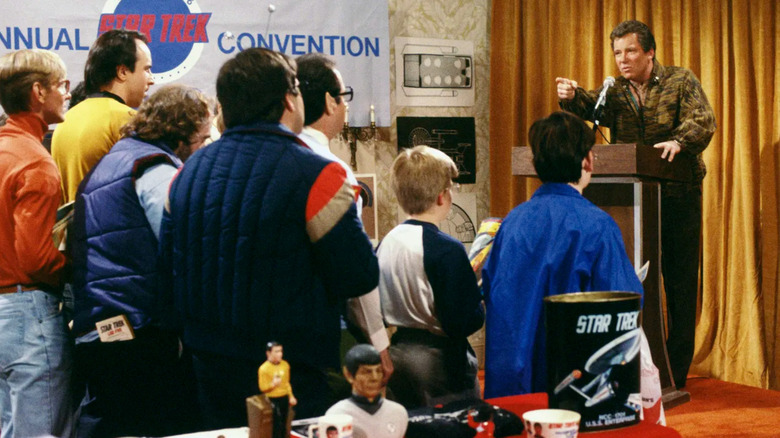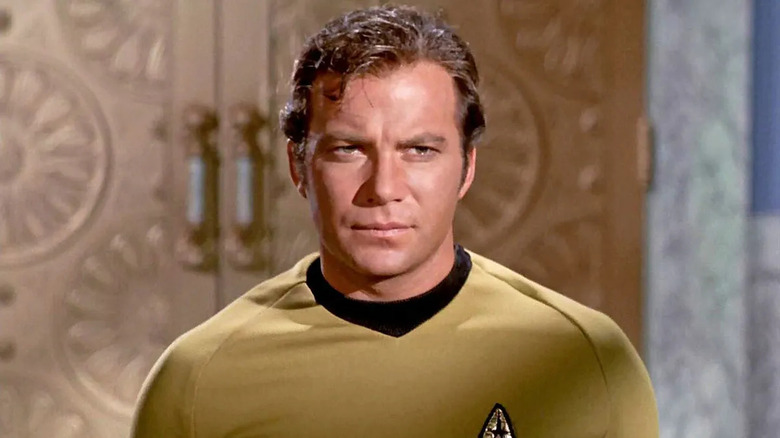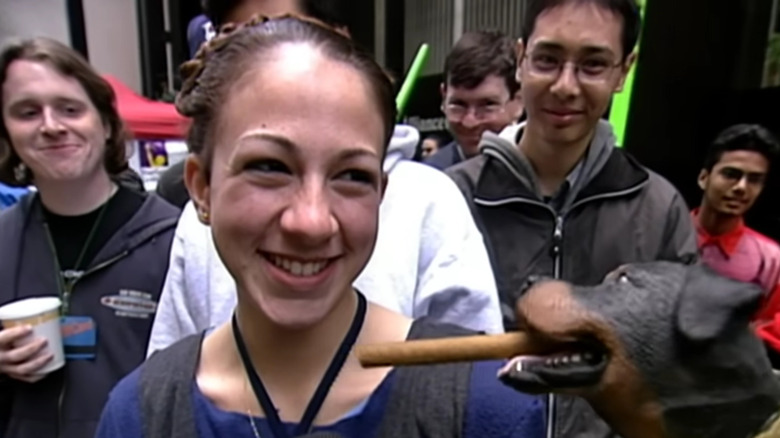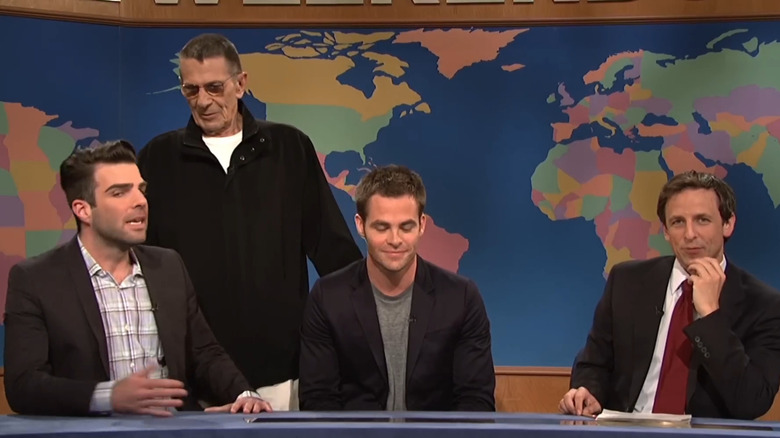Why William Shatner's 1986 SNL Appearance Left Some Star Trek Fans Furious
We may receive a commission on purchases made from links.
William Shatner played the beloved Captain Kirk in the "Star Trek" franchise on and off for nearly 30 years, but he wasn't always comfortable with the role. The shows and films themselves were fine; the issue was that he didn't quite know how to handle the fandom. He was bewildered by all the dressing up and the seemingly-obsessive questions fans asked him; at one point, fans attempted to tear off his clothes as he was walking out of 30 Rockefeller Plaza, and at another point someone tried to shoot him at a fan event in Germany.
Simply put: by 1986, Shatner was getting sick of the Trekkies, so when he hosted "Saturday Night Live" that year he decided to let them have it. He played himself in a sketch at a "Star Trek" convention where he snapped at the fans, telling them, "Get a life! ... For crying out loud, it's just a TV show. I mean, look at the way you're dressed... You've turned an enjoyable little job I did as a lark for a few years into a colossal waste of time."
The sketch was controversial to say the least. Although many Trekkies found it mean-spirited, the subsequent decades of increasingly toxic fandom behavior around all sorts of franchises have made Shatner's outburst seem more sympathetic. We've had so many examples to learn from of just how unhealthy fandoms can get, so when Shatner talks about how "Star Trek" fans made him uncomfortable it's easy to believe him.
At the same time, the sketch was pretty harsh, with Shatner shaming the fans for having never "kissed a girl" and "living in their parents' basements." The sketch was popular outside the "Star Trek" fandom — not necessarily because it was pointing out the dangers of parasocial relationships with actors, but because it was seen as a cool guy picking on a group of nerds. It was the epitome of low-art, easy-target humor.
It didn't just upset the fans; Rod Roddenberry, the son of "Star Trek" creator Gene Roddenberry, told The Hollywood Reporter in a 2021 interview, "I never really appreciated that skit because I think it was demeaning to the fans. I think it was disrespectful, especially for a character who was an open-minded, intelligent leader." He also added, "I don't condemn it in any way. It's 'Saturday Night Live,' and it's all fun."
William Shatner responded to the backlash
In 1999, Shatner wrote a book titled "Get a Life!" where he talked about how he trusted fans not to take the sketch too seriously, given that it was written to be "SO exaggerated and SO stupid and SO cartoonish" that surely it was clear it was all meant in good fun. He noted that in the weeks after the sketch aired he'd gotten far more praise than scorn, even from Gene Roddenberry at the time: "No one was ever more protective of Star Trek's fans than Gene, and I really expected he might take me to task."
Shatner also grew annoyed with the continued talk about the sketch, especially after an interview presented him with Rod Roddenberry's critical 2021 comments about it. He argued in a tweet at the time that the backlash to the sketch today is "presentism." By that, he meant that the modern conversation around it "applies today's value systems & beliefs about what is 'bullying' & what is 'disrespectful' to a time when those were not the values or opinions and nobody was really offended but the mindset people have is that it makes them look intelligent & caring."
In "Get a Life!" Shatner displayed plenty of respect for his fans overall, and even displayed a bit of regret over how he felt about them earlier in his career:
"Who were these people? Were they sane? Were they sober? Did they really need to 'get a life'? To be brutally, humiliatingly honest, that now-infamous 'Saturday Night Live' sketch was for me, at that time, equal parts comedy and catharsis. I was oblivious to the facts. I bought into the 'Trekkie' stereotypes. In a nutshell, I was a dope."
Contrary to popular belief, Trekkies weren't all pissed
Although most of the discourse around Shatner's famous "SNL" sketch centers around the upset fans, it's worth noting that a lot of Trekkies found (and still find) it funny, often quoting it at each other during inter-fandom disagreements. If you go to YouTube videos of Shatner discussing the incident, most Trekkies in the comments seem perfectly fine with it. Many people deeply invested in fandoms like "Star Trek" or "Star Wars" or "Doctor Who" tend to have a sense of humor about these sort of jokes, often happily willing to concede that it is all a bit silly, even if there's plenty about it that's still rewarding.
This is why one of the funniest sketches to come out of "Late Night With Conan O'Brien" took place during the opening week of "Star Wars: Episode II — Attack of the Clones." The segment is just 12 minutes of a recurring guest, Triumph the Insult Comic Dog (Robert Smigel), talking to the "Star Wars" fans waiting outside the theater and ruthlessly mocking them. When he meets a guy dressed like Darth Vader who shows him the buttons on his costume, Triumph says, "And which of these buttons calls your parents to come pick you up?"
Most of Triumph's jokes are absurdly hacky and cruel, but they work because the fans in line are clearly finding it funny. Turns out, bullying is easier to handle when the bully in question is a cigar-smoking dog.
The 1986 sketch underlines how much our culture has changed
Since the "Get a Life!" sketch aired, it's noticeably gotten a lot easier to be a hardcore fan of "weird" and "nerdy" franchises like "Star Trek." This shift could already be felt just 10 years later, during a 1996 controversy about a female juror who showed up to the televised Whitewater trial in a "Star Trek" uniform. The radio show "This American Life" did a whole segment about it at the time, noting that although the woman in question was reportedly an "excellent juror, very serious, took copious notes," she was nevertheless dismissed from the jury.
The public was divided about the Trekkie juror, with some people mocking her and others finding her interesting or harmless. Many "Star Trek" fans felt embarrassed by her actions, seeing it as playing into the trope of the "loser" Trekkies presented in Shatner's sketch, whereas other fans saw it as a clear shift in their favor. As media scholar Henry Jenkins explained in the "TAL" episode:
"Her choice represents a new kind of fan identity politics, as you would, that we're tired of being told by William Shatner and others to get a life. We're tired of being stereotyped as living in our parents' basement. In fact, we are a wide variety of people who happen to believe in the cultural power of television and of all art to change the way we think about the universe. So what's exciting about the fan's behavior is that she wasn't afraid. She didn't hide. She asserted very publicly who she was and what her commitments were."
Fandom behavior became increasingly unafraid in the years that followed, to the point where "Saturday Night Live" wrote a spiritual sequel to the "Get a Life!" sketch in 2009. This time, it was Chris Pine and Zachary Quinto (who played Kirk and Spock in J.J. Abrams' "Star Trek" movie) trying to appease the concerns of skeptical Trekkies, with the help of a surprise Leonard Nimoy appearance. Yes, the sketch still portrays Trekkies as being nerdy and obsessive, but it also acknowledges the power shift between fans and creators that had occurred throughout the 23 years since Shatner's hosting. For better or worse, the creatives involved in most major franchises really do have to take the fans seriously now. They probably wouldn't dare make a "Get a life!" sketch today.



